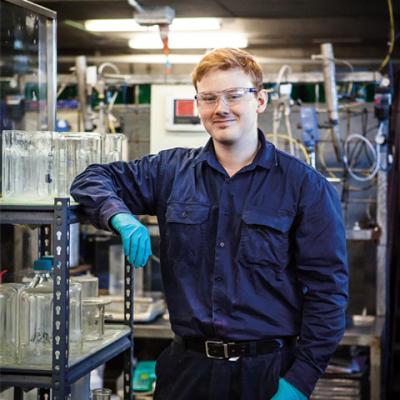
Field of Study
Chemical and Biomedical Engineering
Bachelor of Engineering (Honours) and Master of EngineeringBiomedical engineers create materials, devices and processes for better health outcomes.
Biomedical engineering bridges the gap between technology, medicine and biology. It integrates physical, chemical, mathematical and computational sciences and engineering principles with the ultimate aim of improving health care.
Biomedical engineers may be involved in the design, construction and development of health and monitoring devices and computers, implantable devices, diagnostic systems and therapeutic systems, cell and tissue engineering, and the development and manufacture of pharmaceuticals. They may also work with models of physiological function and prosthetics and implants.
This field of study combines our undergraduate engineering program with master’s level coursework and a semester-long placement or research thesis with an industry or research partner. These courses are designed to provide specialist knowledge of the various disciplines and place you closer to the leading edge of technology.
Industry needs graduates who can apply new technologies to existing and emerging industries. The master’s courses will give you a clear advantage when applying for jobs that require advanced skills and capabilities.
Career possibilities
Our programs prepare you for your first job and beyond. Here are some of the careers you could be on your way to:
- Biomedical engineer
- Chemical engineer
Average annual salary range
Biomedical Engineer
seek.com.au
Events
See all events
29 June - 6 July
Year 11 Queensland Chemistry Winter School

29 June
Queensland Biology Winter School, Year 12

1 July
International Baccalaureate Research Skills Program
Stories
See all stories
Uni life
What’s it like to study resource development (mining) as a postgraduate?
6-minute read

Study tips
5 must-study environment and sustainability courses
8-minute read

Study tips
UQ science scholarships to help fund your studies
8-minute read
Stories
See all stories
Uni life
What’s it like to study resource development (mining) as a postgraduate?
6-minute read

UQ people
From firefighting robots to rocket science: Vennkkata’s UQ experience
5-minute read

Study tips
5 must-study environment and sustainability courses
8-minute read
How you'll learn
Your learning experiences are designed to best suit the learning outcomes of the courses you choose.
- Lectures
- Tutorials
- Work placements
- Overseas study
- Laboratory work
- Fieldwork
- Workshops
What you'll study
At UQ, subjects are called 'courses'. Here's a sample of the courses you could study:
- Chemical Thermodynamics
- Fluid and Particle Mechanics
- Bioprocess Engineering
- Biomaterials: Materials in Medicine
Keep up to date
Sign up to get information about applying and studying at UQ.


